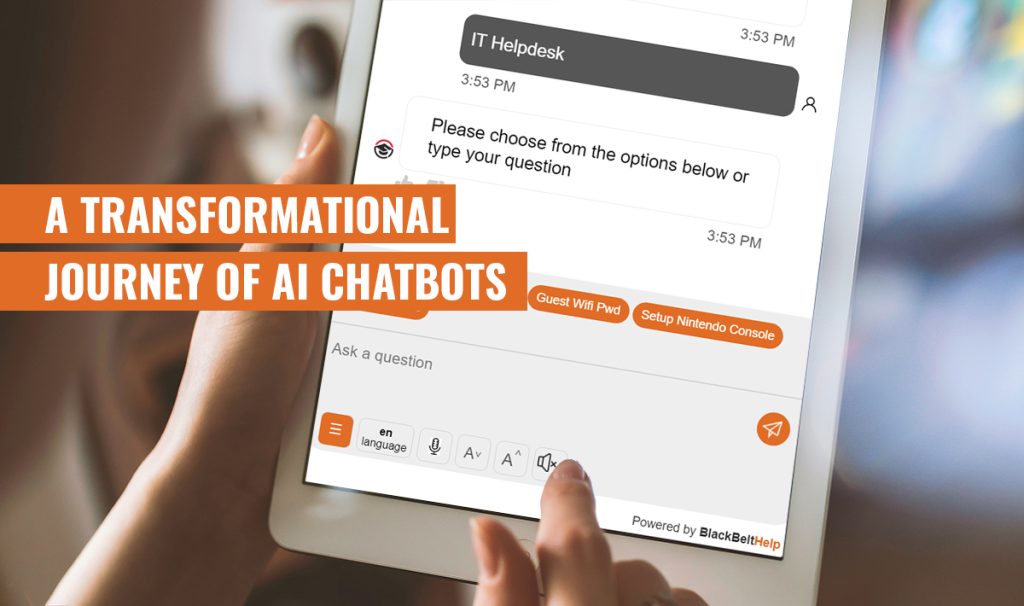A Transformational Journey of AI Chatbots in 2024

Many present-day students have been immersed in technology since childhood, making them highly proficient in using personal devices for communication round the clock. It’s not uncommon for a potential student to explore your website late at night and suddenly have inquiries that, if addressed promptly, might influence their decision to apply to your institution. However, you can only lose their interest if you respond.
This is where one of the newest advancements in communication technology comes into play: the AI chatbot.
What is an AI chatbot, and how does it work?
An AI chatbot is a software program designed to simulate conversation with human users, typically through text-based interfaces such as messaging apps, websites, or mobile applications. These chatbots utilize various technologies, including natural language processing (NLP), machine learning (ML), and sometimes even deep learning algorithms, to understand user input and provide appropriate responses.
Use of AI chatbots in Higher education
Higher education institutions face increasing demands for efficient and responsive support services in today’s fast-paced digital era.
However, traditional help desk models often need to meet these demands. Operating within limited hours, they leave students without assistance during evenings, weekends, and holidays, a significant inconvenience for students seeking support beyond regular business hours.
Moreover, the high volume of inquiries frequently results in long wait times, leading to student frustration and dissatisfaction. Human error and inconsistency compound these challenges, as help desk personnel may vary in expertise and experience, resulting in inconsistent support quality. Resource constraints, including limited staffing and technology infrastructure, pose additional hurdles, making it challenging to effectively address the user community’s diverse needs.
Furthermore, the lack of personalization in traditional help desk interactions and the struggle to scale operations to accommodate a growing user base underscore the urgency for higher education institutions to explore more innovative and efficient approaches, such as AI chatbots, to enhance their support services in today’s digital age. With the advent of AI chatbot for higher education, universities have a powerful tool to revolutionize help desk operations.
24/7 Availability: One of the most significant benefits of AI chatbots for higher education help desks is their all-time, anytime availability. Unlike human agents, chatbots can handle inquiries and provide assistance at any time of day or night, ensuring that students, faculty, and staff have access to support whenever needed. This 24/7 availability is precious in the context of higher education, where users may have questions or encounter issues outside of traditional business hours.
Instant Responses: AI chatbots excel at providing instant responses to user inquiries, eliminating the need for users to wait in queue or navigate complex phone systems. Whether students have questions about enrollment, course registration, financial aid, or campus resources, chatbots can provide immediate assistance, significantly reducing response times and improving user satisfaction. This instant responsiveness enhances the user experience and helps students stay focused and productive.
Personalized Support: Higher education chatbots can offer customized support tailored to users’ individual needs and preferences. Chatbots can provide targeted assistance and recommendations by analyzing user data and interaction history, such as course suggestions, campus event notifications, or academic resources. This personalized support helps users feel valued and understood, fostering a sense of engagement and loyalty to the institution.
Efficient Resource Allocation: By automating routine inquiries and tasks, Higher education chatbots free up human agents to focus on more complex issues and strategic initiatives. This efficient resource allocation allows help desk staff to dedicate their time and expertise to high-value activities, such as student outreach, process improvement, and proactive support initiatives. As a result, help desk teams can operate more efficiently and effectively, maximizing the impact of their efforts.
Scalability and Flexibility: AI chatbots are highly scalable and flexible, capable of handling an unlimited number of inquiries simultaneously and adapting to changing user needs and preferences. Whether the help desk experiences a sudden surge in inquiries during peak times or needs to accommodate seasonal fluctuations in demand, chatbots can scale up or down dynamically to meet the requirements. This scalability and flexibility make chatbots a valuable asset for higher education institutions, enabling them to provide consistent and reliable support regardless of the circumstances.
Data-Driven Insights: AI chatbots generate valuable data and insights about user behavior, preferences, and trends, which can be leveraged to improve help desk operations and inform strategic decision-making. By analyzing chatbot interactions and sentiment analysis, institutions can identify common issues, bottlenecks, and areas for improvement, allowing them to optimize processes, allocate resources more effectively, and enhance the overall user experience.
The future of AI Chatbots for higher education
As technology advances, AI chatbots are expected to become increasingly sophisticated and capable of providing personalized assistance and guidance to students, faculty, and staff. These Higher education chatbots can offer 24/7 support, addressing inquiries promptly and efficiently, thus enhancing user satisfaction and productivity. Moreover, AI chatbots have the potential to streamline administrative tasks, such as course registration and scheduling, freeing up valuable time for academic staff to focus on teaching and research. With natural language processing and machine learning advancements, AI chatbots are poised to become indispensable tools for higher education institutions, facilitating seamless communication and fostering a more interactive learning environment. In conclusion, universities can transform their help desk operations by leveraging chatbot technology. They can enhance user satisfaction and empower students, faculty, and staff to succeed in their academic and administrative endeavors.
